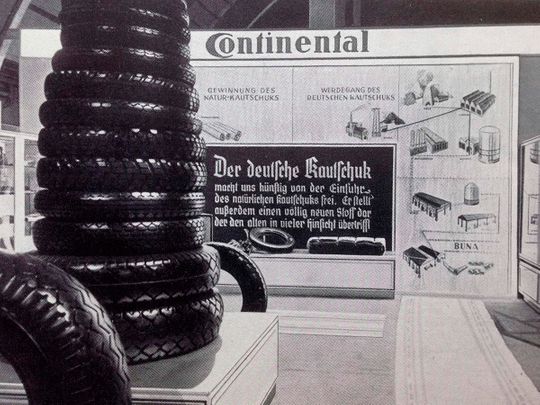
Auto parts maker Continental became the latest German company to issue a confessional study of its Nazi past, saying it was “a pillar of the National Socialist armaments and war economy” that employed around 10,000 slave labourers, often in inhumane conditions.
During the war, when Continental supplied tyres for military aircraft and vehicles, the company used concentration camp inmates to test products, and the inmates often died as a result, according to the study by Paul Erker, a historian at Ludwig Maximilian University in Munich commissioned by Continental to examine its past.
Yet after the war, top managers of the company managed to escape punishment and pursue successful careers, according to Erker, who spent four years doing research for an 800-page book on Continental's wartime history. The study also looked at firms that Continental acquired after the war, like VDO, a maker of auto electronics that supplied guidance systems for V-1 rockets fired at Britain by Germany during World War II.
Such studies have become obligatory for German companies, which often used slave labourers, profited from the Nazi regime and took part in the persecution of European Jews. But Continental, a member of the benchmark DAX index with 230,000 employees worldwide, is far behind other blue-chip companies like Volkswagen or Deutsche Bank that laid bare their wartime pasts decades ago.
Elmar Degenhart, chief executive of Continental since 2009, said the study was "overdue" but could not explain why it had taken so long.
"We can't speak for earlier generations of management and don't want to make any accusations against them," Degenhart said during a news conference Thursday.
Many prominent German companies have still not underwritten detailed studies of their behavior under Naziism. Erker lists some of them in a footnote in his book: electronics giant Siemens; detergent maker Henkel; and chemical and pharmaceuticals maker Bayer, which during the war was a part of the notorious IG Farben conglomerate. IG Farben built a synthetic rubber factory that depended on slave labour from nearby Auschwitz and produced the gas used to kill concentration camp inmates.
Although best known for tyres, Continental, based in Hanover, also makes a wide array of automobile components like electronic sensors and brakes.
Founded in 1871 by Jewish bankers, Continental had many Jews in high-ranking positions when the Nazis took over in 1933. By 1938, as Germany was gearing up for war, they had all been forced out. While supplying the German military with tyres, bullet-resistant fuel tanks, gas masks and brakes for battle tanks, Continental and its subsidiaries also produced consumer products like soles for shoes and hot water bottles that helped fulfill the regime's promise to deliver prosperity to the German people.
The first forced labourers at Continental were French or Belgian civilians or prisoners of war. Often the workers were exposed to toxic chemicals without any protective clothing, the study found.
As able-bodied German men were conscripted into the military, creating a severe labour shortage, Continental drew on concentration camp inmates. They were sometimes forced to work in abysmal conditions underground, where production facilities were moved to escape Allied bombing raids.
In the Hanover suburb of Ahlem, for example, about 750 inmates at a time worked in a former mine in extremely damp, cold and dark conditions under supervision of brutal SS guards. The inmates slept crowded into horse stalls, and hundreds died.
Continental also produced soles for shoes, a critical commodity in wartime because of an acute shortage of natural rubber. To test the durability of different types of synthetic rubber soles, Continental enlisted help from the SS, according to correspondence between the feared Nazi organization and company executives.
SS guards forced inmates at the Sachsenhausen concentration camp north of Berlin to walk 11 hours a day around a test track wearing shoes made with the experimental soles, Erker's report said.
The shoes were often the wrong size, and the inmates were not given socks. The SS guards beat the inmates and made them sing German military songs as they marched a route that took them past the gallows where other inmates were hanged for infractions.
Many of the poorly fed inmates died from the exertion, according to Erker's study. The SS provided Continental with detailed data on how quickly different varieties of synthetic rubber wore out.
Continental was among German companies that together paid about $4.5 billion in reparations to former forced labourers in the late 1990s. The company said recently it would display a commemorative plaque with the names of all the forced labourers who could be identified.













